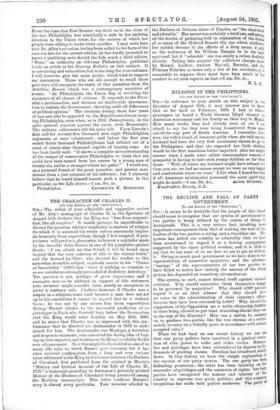THE CHARACTER OF CHARLES II.
[To THE EDITOR OF THE " SPECTATOR:1 Sra,—The writer of your admirable and suggestive review of • Mr. Airy's monograph of Charles II. in the Spectator-of August 10th declares that the King was " free from supeusti- tion;like all sceptics." It would, perhaps, be unprofitable to discuss the- question whether scepticism in matters of religion (to which it is assumed the writer refers) necessarily implies animmunity from superstition, though I feel tempted, if your reviewer will pardon a pleasantry, to borrow -a rejoinder made by the irascible John Dennis in one of his pamphlets against Steele : "I am afraid, my dear friend, it will be found upon inquiry that the very contrary of this is the eternal truth," and the learned Le Clem who devoted his studies to this somewhat recondite subject, expressly asserts in his " Causes of Incredulity" (1697) that "there is nothing so common as to see unbelievers strongly persuaded of Judiciary Astrology." The -.question is not, perhaps, of. great importance; and if examples were to be adduced in support of this Statement your reviewer might consider them- merely as exceptions to prove a contrary rule. I believe, however, if Charles was 'a sceptic in a religious sense (and because a --man does- not -act up'to his convictions it cannot be argued that he is without them), be was not by any means free from superstition Bishop- Burnet alludes to the successful prediction of an astrologer in Paris who foretold long 'before the Restoration that the King would enter London on May 29th, 1660, and he States that Charles was so impressed with this per- formance that he directed his Ambassador in 1678 to mike search for him. The Ambassador was Montagu, a viorthlekS and desperate character, who conceived the daring idea of buy: lag up this impostor, and trading on the King's credulity forlia owe advancement. Now this might be discredited as one of so many idle tales to which Burnet gave currency, but it has since received confirmation from a long and. very Curious letter addressed to the King by his former mistress, the D uchess Of Cleveland, first published from the original in Harris's "-History and Critical Account of the Life of Charles II., 1765,"-a transcript according to Steinman's privately printed Memoir of the Duchess of Cleveland being preserved among the Harleian manuscripts. This letter confirms _ Burnet's story in almost every- particular. Yeiu- reviewer alluded to
: .
the Duchess of Orleans, sister of Charles, as "the short-111w and adorable." Her career was certainly a brief one, and among all the stories of poisoning told in explanation of the deatis of so many of the ill-fated Stuarts the one which attributes her sudden decease to the effects of a drug seems, if only on the testimony of Sir William Temple, to be the least equivocal, but if " adorable " she was surely a rather doubtful divinity. Taking into account the collective charges mad, by Burnet, Ludlow, Andrew Marvell, Reresby, and Abe Princess Palatine, to name only a few of her assailants, it is reasonable to suppose there must have been much in her conduct to set such reports on foot.—I am, Sir,
H. L. S.


































 Previous page
Previous page